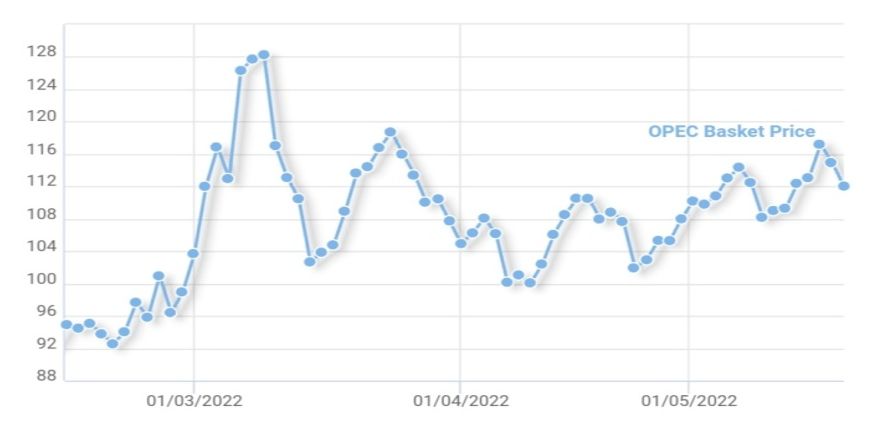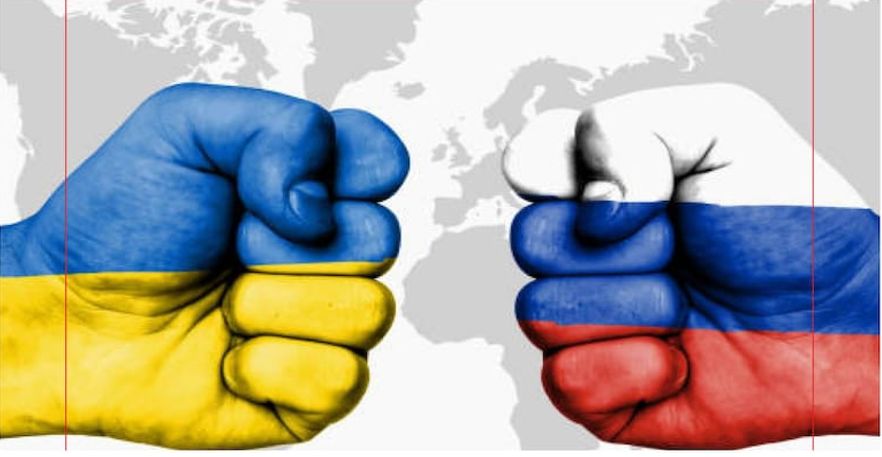- Umang Sagar
- Economy, Polity, Recent article
Crude Oil Politics

Introduction
“Brent oil prices have increased to a near 14-year high of $140,” said Rahul Kalantri, VP Commodities, Mehta Equities Ltd. Due to delays in the prospective return of Iranian petroleum to global markets and as the US and its European allies explore banning Russian oil imports, oil prices have risen to their highest level since 2008.”
“According to some predictions, world oil demand will grow by 2% per year on average over the next few years, with a conservative 3% natural decline in supply from existing reservoirs.
So, where will the oil be produced? While many parts of the world offer excellent oil prospects, the Middle East, which produces two-thirds of the world’s oil at the lowest cost, remains the prize at the end of the day, despite firms’ desire for more access and slow progress.

OPEC (Organization of the Petroleum Exporting Countries) Member Countries added 71.1 billion barrels to their total proven crude oil reserves between 2011 to 2020, a significant increase compared to other crude oil producers.
History
Crude oil pullback has taken place before. On November 20, 1920, the United States broke a streak of over 100 consecutive days of record-high crude oil prices by oil collapsing to $0.42 a barrel on the New York Stock Exchange.
M. King Hubbert, a Shell geophysicist, correctly predicted that US oil output would peak in 1970 in 1956.
Former US President Bill Clinton remarked in a speech in June 2006, The more emission of greenhouse gases into the atmosphere is still driving globalization. That was true during the industrial revolution, but it is no longer true. True, the old energy economy is well-organized, well-financed, and politically linked.”
OPEC Basket Price

- It was introduced on 16 June 2005, is currently made up of the following: Saharan Blend (Algeria), Girassol (Angola), Djeno (Congo), Zafiro (Equatorial Guinea), Rabi Light (Gabon), Iran Heavy (Islamic Republic of Iran), Basra Light (Iraq), Kuwait Export (Kuwait), Es Sider (Libya), Bonny Light (Nigeria), Arab Light (Saudi Arabia), Murban (UAE) and Merey (Venezuela).
Crude Oil Diplomacy
- As the government kept raking in more debt, the interest rates went up, industrial activities went down and inflation shot up. Oil became an important commodity during the later stages of the Industrial Revolution in the early 20th century. When modern warfare evolved to accommodate the growing demand for petroleum, it became an important aspect of diplomacy. Thus oil plays a key role in geopolitics as nations around the world seek to secure oil supplies through trade, diplomacy, armed conquest or any other method it sees fit to employ. Usually, the country that has the largest number of oil reserves can virtually dictate any terms it sees fit. Such petrol-rich nations can also initiate international conflicts, which is termed petro-aggression. An example of this is the Iraqi invasion of Iran and the Gulf War of 1990 – 1991.
Indian Scenario
India, the world’s third-largest oil importer, is now buying American crude alongside South Korea, Japan, and China.
India’s overdependence on OPEC for imports is reduced by utilising the potential of this alternate supply option.
It also offers up new doors for India’s purchasing selections to be more diverse.
On the other side, it strengthens India’s bargaining position with OPEC members.
It has also widened the scope of Indo-US relations.
It appears to be significantly minimising the impact of global oil price uncertainty on the Indian economy.
Geopolitics Of Oil Money
Many of the world’s main oil-producing countries are either politically unstable or at odds with the United States, which is a sad reality. The Organization of Petroleum Exporting Countries (OPEC) includes the majority of these countries (OPEC). OPEC countries produce around 40% of the world’s oil, but they retain 80% of proven worldwide reserves, with 85 percent of those reserves located in the Middle East.
OPEC countries’ oil riches allow them to serve as a strategic pivot in global politics and economics. However, their record on human rights, political stability, and international law compliance is dismal.
State sponsors of terrorism control 22% of the world’s oil, which is subject to US/UN sanctions.
Only 9% of the world’s oil is held by countries classified as free by Freedom House. The three non-Middle East OPEC nations have the highest corruption rating in the world, according to Transparency International’s Global Corruption Report from 2002. Venezuela was placed 81st out of 102 countries, with Indonesia 96th and Nigeria 101st. “Corruption, perpetuated by skewed standards of living and a lack of transparent governance across the Middle East and North Africa, is a fundamental barrier to the region’s economic development,” according to the research. All countries, from Yemen, which has a per capita income of roughly $300 per year, to the United Arab Emirates (UAE), which has a per capita income of around $18,000, are affected.
Key Oil Producing Countries
Countries | Contribution |
United States Saudi Arabia Russia Canada China Iran | 18.6 million barrels per day 10.8 million barrels per day 10.5 million barrels per day 5.3 million barrels per day 4.9 million barrels per day 3.19 million barrels per day
|
Implications Of Usa Growing Power In Global Oil Politics
“US Shale Revolution,” the United States has gradually contributed to rising global oil production.
It is clear that the United States is gaining strength in global energy politics. The Robust Strauss Centre for International Security and Law, for example, claimed that sanctions against Iran and Venezuela led to rising oil prices in 2018 and 2019.
The United States’ significant oil and petroleum production boosts its domestic economic growth. Nonetheless, whether the United States has entirely dominated global oil politics is a contentious issue.
There is no definitive answer to who owns the oil power between the United States, Saudi Arabia, and Russia.
But one thing is sure: the United States’ expanding influence in oil politics is helping to create a more balanced and competitive oil market, preventing any monopoly or dominance by a single organization, region, or country. This may appear to be a good thing, but the reality is that oil prices are continuously fluctuating.
Russia-Ukraine Crisis

As word of the Russia-Ukraine conflict intensified, all Asian markets plummeted. The Sensex was down 1,600 points today, while the Nikkei 225 in Japan was down 850 points, or 3.27 percent. The Hang Seng index in Hong Kong was down nearly 700 points, and the ASX All Ordinaries index in Australia was down over 1%. In India, gold prices have also surpassed the Rs 53,000 threshold.
“Russia exports 4 million to 5 million barrels of oil per day, making it the world’s second-largest crude exporter behind Saudi Arabia,”Kalantri continued. We expect crude oil prices to remain stable in the face of increased demand and geopolitical uncertainties. In the coming sessions, WTI prices may touch $140 a barrel, while Brent prices may test $134 a barrel. In today’s session, crude oil has support at $118–110.40 and resistance at $129–140. Crude oil has support at Rs 8,575-8350 and resistance at Rs 9,000-9120 in Indian rupees.”
India’s crude oil prices had risen by 12% to over $125 per barrel as of 10 a.m. According to moneycontrol.com, it was around Rs 9,609 in Indian rupees.
“Crude prices achieved their greatest weekly rise since the middle of 2020,”Kalantri continued. Brent prices increased by 21%, while WTI prices increased by 26%.”
Gas prices are strongly tied to oil prices, according to The Guardian. On Friday, European gas prices reached a new high. Prices could grow even higher in the following days.
US Secretary of State Antony Blinken claimed in an interview with CNN that the US and its allies are aiming to prohibit Russian oil imports. CNN also claimed that a significant oil depot in the Luhansk region of eastern Ukraine is on fire, according to CNN.
The Economic Impact Of The Russia-ukraine Conflict On India
- Russia and Ukraine began a fight on February 24, 2022, affecting the Indian economy and causing implications and impacts in several areas and aspects. India abstain from voting at a United Nations (UN) meeting. At the UN meeting, India has taken a neutral posture.
Top 13 Interesting Facts About Crude Oil Politics
The crude oil pullback has happened before. However, the implications have changed.
The United States had no imports on November 21st, 1920. The United States has a higher oil demand, as well as gasoline, in the face of low supply.
It’s not just about the companies, individuals, and governments that were involved. Crude oil, the result of drilling and refining by the oil companies, has always had a different public perception than whether you use it or not.
According to The Guardian, oil prices may soon surpass the all-time low as a result of the economic decline.
The world has ever been witnessing a tumultuous time owing to the volatile crude oil politics of the world and its fluctuating price.
Reports have now suggested that Indian oil imports from the US are set to rise by 11% this year.
Libya’s production declined because of the political situation there. In 2014, OPEC production also increased.
Since war broke out, two million refugees have fled the country, 650,000 are without electricity, and 130,000 have no natural gas supplies.
In Ukraine, a rapidly deteriorating humanitarian crisis is brewing, with hundreds of thousands of residents stuck in confined cities without access to water, food, or energy as Russian soldiers move deeper into the nation.
Two million residents have fled the nation since President Vladimir Putin authorized an invasion on February 24, making it Europe’s fastest-growing refugee crisis since World War II.
In 1975, in response to the Arab oil embargo and gasoline shortages, an export ban on American oil was established.
Indian Prime Minister Narendra Modi recently secured a comprehensive review of trade relations, particularly in the energy sector. Soon after, major Indian oil companies began placing orders for crude from the United States.
Over 4 million barrels were ordered by Indian Oil Corporation and Bharat Petroleum.



